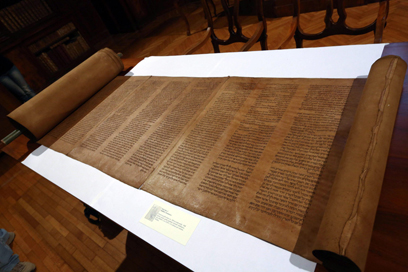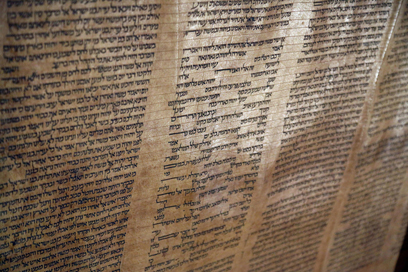The precious lambskin scroll had been classified by the university library as being from the 17th century and was named simply "Scroll Number Two."
Video courtesy of jn1.tv
But Hebrew Studies Professor Mauro Perani told AFP he noticed that the text did not conform to key changes in Torah writing brought about in the 12th century.
"I immediately thought it was much older," he said, adding that it contained letters and signs that were banned by Jewish scholar and philosopher Moses Maimonides in the 12th century.
The Torah was among around 30 Jewish manuscripts in the university library that Perani began to catalogue in February of this year.
"The scroll is very rare because when manuscripts spoil they lose their holiness and can no longer be used. They are then buried," he said. "The state of conservation is excellent."

Scroll discovered at University Library of Bologna (Photo: EPA)
Tens of thousands of Torah scrolls were also destroyed by Nazi Germany and Fascist Italy or re-used to bind books, he said.
The oldest previously known scroll dates from the late 13th century, although a biblical codex - which has a book form instead of being rolled up - exists in St Petersburg that dates from 1008.
Carbon dating in Italy and the United States confirmed his findings, placing the manuscript between the late 12th and early 13th centuries.

Originally classified as being from 17th century (Photo: EPA)
The intact scroll is 36 meters (118 feet) long and 64 centimeters wide and the report said it had been mislabeled by an archivist in 1889.
"He said the text looked awkward and contained uncommon annotations. He was completely wrong, it is a splendid manuscript," Perani said.
The professor said the scroll came to Bologna university from a Dominican monastery in the city, most likely after Napoleon disbanded religious orders in the country in the 19th century.
It was "completely normal" that Dominican friars would have an ancient Torah as there was close collaboration between Christian and Jewish scholars in the early Middle Ages, Perani said.
The city of Bologna has long had a large Jewish community and the university first began teaching Hebrew Studies in the 15th century.
Fragments of the Torah have been found from the 7th century -- much older than the presumed date of the Bologna scroll -- but the Italian find is believed to be the oldest wholly preserved text.
In Jewish tradition, Torah scrolls are not dated.















